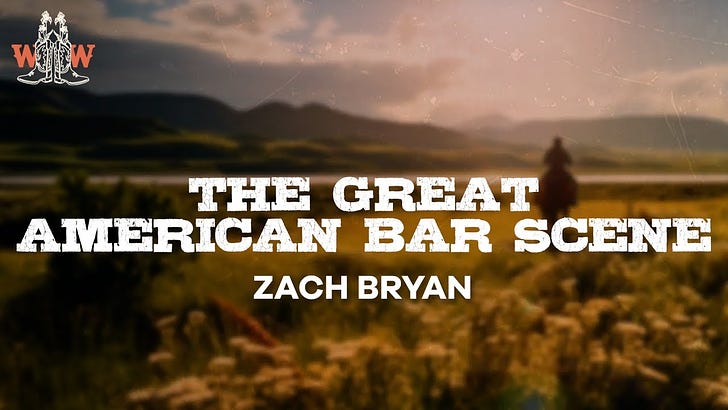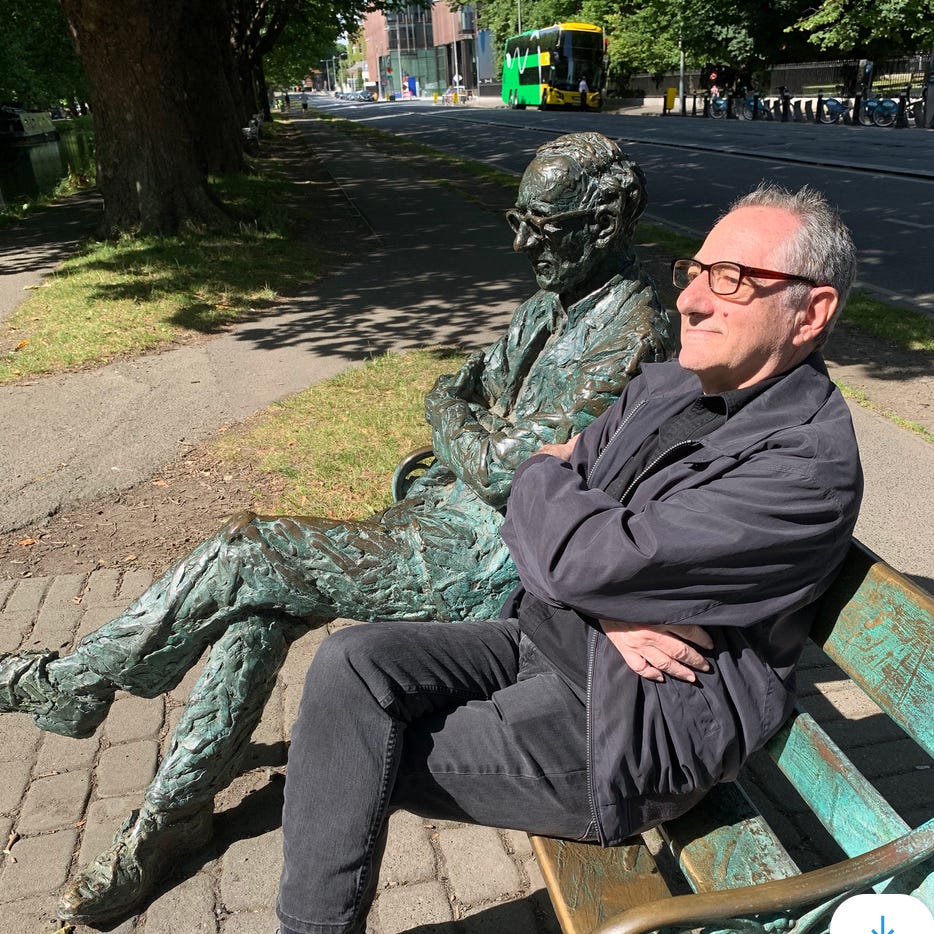Even the armed forces news is amazed at the speed with which Navy veteran Zach Bryan became a music star.
He was still on active duty in 2020 when he went behind his barracks to make an iPhone recording of "Heading South," according to Military.com.
You may have heard variations of this story before: It went viral on You Tube and Tik Tok, and Bryan got an offer from Warner Music. Yet he is the least Tik-Toky artist I can imagine. Less than three years ago, in November 2021, the Navy--in which both of his parents, his uncles, grandfather and great-grandfather served--gave him an honorable discharge after eight years of service to do his music full-time.
He immediately went to war with Ticketmaster over the costs of attending his concerts, and released a live album from Red Rocks Amphitheater in Colorado on Christmas, 2022, with the title song "All My Homies Hate Ticketmaster." And he just kept on recording and seems to have never stopped.
His new album, The Great American Bar Scene (Belting Bronco/Warner) was released on the 4th of July. It served as my introduction to the full range of poetic storytelling that has allowed Bryan to smash genres and build an audience that has gone so far beyond his native Oologah, Oklahoma. His current tour sells out arenas and stadiums in Philadelphia, Boston, and Brooklyn. He sold nearly 40,000 tickets to two shows at the Barclays Center in Brooklyn last spring, and concludes the tour there December 18-19, 2024. It's called the "Quttin' Time" tour, and Bryan, who has hardly ever been interviewed at length, says he's retiring from the road.
But he hasn't defeated The Man, quite yet: Stub Hub is selling seats for his concert Wednesday, July 17 at Gillette Stadium in Foxborough, Mass., in the mid $400 and $500 range.
Back in the 1960s, when Bob Dylan, the Beatles, and so many others made rock lyrics more sophisticated than they had been, there was a debate among scholars and fans over the question: "Are rock lyrics poetry?" It's now a 60-year-old question, and my answer is, "sometimes, but that's not the point." A poem can be read on the page or recited; a song has to be sung.
Bryan knows the difference: He opens the album with a poem, recited in an Oklahoma flatlands accent that may be unfamiliar to many of us with accents from Long Island, the boroughs of New York, the neighborhoods of the northeast. Which, by the way, are written about in The Great American Bar Scene like someone who knows his way around these parts:
If I'm lucky enough, I will get through hard things
And they will make me gentle to the ways of the world...
If I'm lucky enough, I'll get high and invite a guitar player over
And he'll play sweet notes until a New York City-rooftop sun rises
Bryan's cadence and delivery have few antecedents, but there is an interesting distillation of local nostalgia, living and loving hard, rhyme rhythms redolent of rap--if you're a 28 year old wordsmith today, it's part of your toolkit. But the best nostalgic songs summon Paul Simon, and the in-the-moment struggle songs can't help but being influenced by Bruce Springsteen.
All of the day-after-release reviews I tried to avoid reading mentioned Springsteen's understated but dramatic 1982 Nebraska album, and it's a valid connection. But I was bothered by the NPR writer who nullified the value of the review by referring to Springsteen as "The Boss." It's too cute, too familiar, and a cliché: most rock critics with any dignity avoid this nomenclature. Be your own boss, let Bruce be Springsteen!
Mr. Springsteen appears on "Sandpaper," the 15th of 19 tracks. Springsteen is just here to sing a verse and sing harmony on another, but it's not a stretch for him to meld voices with 28-year-old Bryan's reflections on where his life is now: "They've been trying to smooth me out/For 27 seasons now."
On the song "28," the person he's singing about "took a train to the south side of Boston"; it's not clear whether the song's protagonist went along, but the vantage point of the singer is Brooklyn, where "there's smoke seepin' out of the bar down the street/But we're home somehow."
There's another song that takes place in the New Jersey of "Nebraska," if that makes sense. The title, "Oak Island" is a fictional place with a saloon called Jay's tavern. The singer is a rail-tie worker (Bryan took the name from a rail terminal in Newark). "There's some boys out in Jersey that are calling me out by name/I got reason to believe I ain't bound for glory anyway." The singer may be protecting his brother by seeking out the bad boys first: "No blood in the mud I's raised in/Spent life on the run."
You may note the vernacular use "I's," a regional contraction for "I was". But it could also be "I is," more active than the past tense. Bryan is particularly interesting when using these idioms. "Like Ida" is about a couple taking different directions. "I'm halfway to Dallas, stoned out of my mind...'Bout full-time since you left me here to die last August." She's on her way to Nashville..."that shit just ain't my scene." It's a warning, because "They don't know ya' like ida." Like ida: Like "I do."
Similarly, one of the most affecting songs, the first single "Pink Skies," is about going back home for a funeral. (Maybe his mother's?) That Oklahoma vernacular is used to almost comic effect: "If you could see 'em now, you'd be proud/But you'd think they's yuppies." Present tense meets past tense again. "They's" is quite a word, if you've got the accent to get away with it.
You may notice that this, though marketed country and on the country charts as well as succeeding on the pop charts, is not a conventional country musician or singer. The instrumentation avoids steel guitar, fiddle, and the rest, and is not short on good guitar riffs, occasional ambient sound, yet it's not overpowered like high-density country rock. Bryan doesn't sing in a whisper, but his voice draws you close. That is part of his arena rock appeal, I think, that even if you're in the bleachers, you can hear him speaking to you. On You Tube, for example, many of the comments are from young men and women who have found Bryan's music a tonic for their PTSD, families with cancer, sadness, and depression. I'm told by a friend who lives in the real state of Nebraska that in Omaha not long ago, Bryan and his band went out and helped the clean-up after tornados hit the area. A reporter was shoo-ed away: They weren't there for the publicity. It's what they do.
Fans also identify with the strength-through-sorrow of "Bass Boat," about nostalgic but not always happy memories of fishing with his dad. Even with his arm around a lover, Bryan sings, "I'm a self-sabotaging suicide machine."
Oklahoma is its own country, not like Texas, not like Tennessee. Too young to be stuck in anyone else's bag, "Funny Man," about God, is much like the approach Paul Simon takes to talk about the Almighty. Another song, "Memphis; The Blues" (sic) is about a disappointing visit to Beale Street: "The thrill is gone so slow and easy/Won't you love me tender..." She does, and there's an erotic thrill when he says to his companion, "let your dress fall to the ground/We're the only ones left who love Otis in this town." The unconventional punctuation is understandable, because he needs this love, "like Memphis [needs] the blues." The featured guest on that track is youngblood country singer John Moreland.
Even John Mayer shows up for not-quite-party, presenting his brief but effective Jerry Garcia grace notes on "Better Days." Bryan breaks form to go right to the anthemic party on ("wet, hot") "American Nights," and shows he knows how to play with rock history. Instead of driving his Chevy to the levee but the levee was dry," from "American Pie," he sings: "We snuck our Fords to the shore and drank a bottle bone-dry."
He name drops Springsteen's "State Trooper" on the title song, but also Johnny Cash's "Hey Porter." That's a nice mix. If music had DNA, "The Great American Bar Scene" would be the offspring of those two songs, and much more than that.




